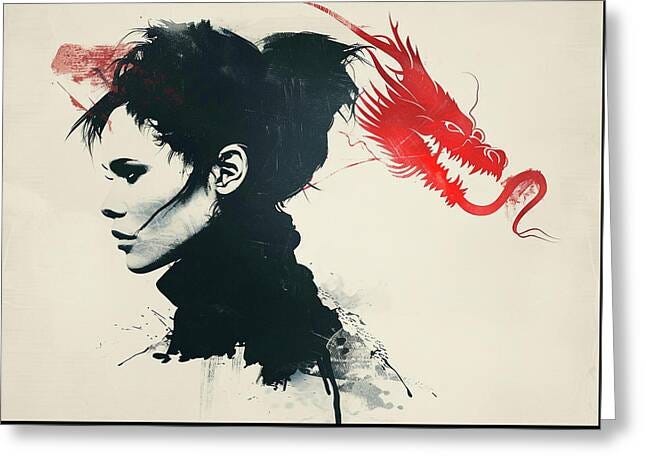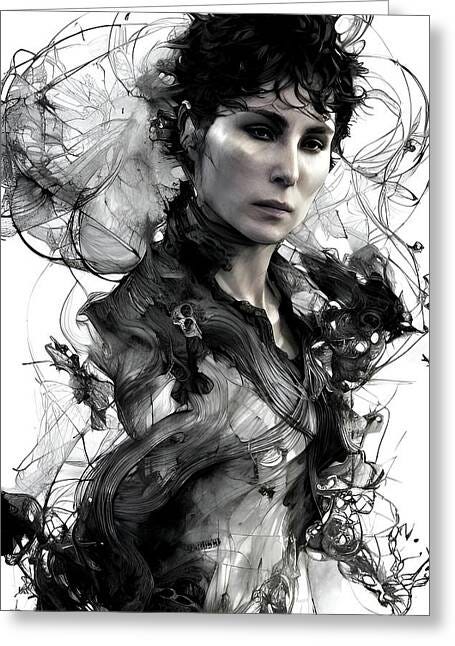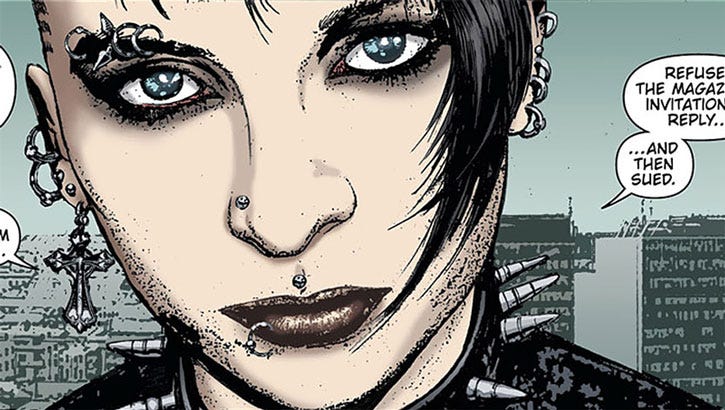Who would have thought Wednesday Addams (from the series Wednesday), yes, the one with the pigtails and the deathly-pale white skin, would become such a favourite? We are talking about a girl who’s morbid, anti-social, rude; who is macabre in her humour, a lone wolf by nature. For her, social media is “soul-sucking void of meaningless affirmation” and ‘Legally Blonde’ is the ultimate horror movie!
But she’s iconic and unique. And heralds, yet again, the advent of the anti-heroine.
Oh, there have been so many. And some nastier than the other! Think Catherine Tramell (Sharon Stone - you know which movie!), Bridget Gregory (the peerless Linda Fiorentino in the nasty ‘The Last Seduction’), Harley Quinn (a chaotic Margot Robbie in ‘Suicide Squad’), et al. These are characters which transcend their stories and enter the folklores of our conversations and times.
But there’s one anti-heroine who refuses to be dislodged from our collective memory, who is almost mythological in her charm and who is almost a byword of what an anti-heroine is, and their continuing fascination in our collective minds.
Lisbeth Salander.
Lisbeth, at first sight, seems to be an unlikely candidate for this Hall of Fame. Slight in built, self-centered in extremis, a social misfit, with multiple tattoos and piercings, Lisbeth tries hard not to be liked. She is the heroine in three films - all in Swedish, albeit the first one also in English helmed by David Fincher, no less - The Girl with the Dragon’s Tattoo, The Girl who Played with Fire, The Girl who Kicked the Hornets’ Nest . These films are based on books by Swedish journalist Steig Larsson, and within their complex plotting paints Lisbeth’s nature - with a consistency which is unvarying, a conglomeration of traits which individually could be cringeworthy, but together are alchemised into something incredibly potent. Lisbeth will not talk if she doesn’t want to. She will not say “thank you” however much someone has done for her. She will not attempt conversation, she will not share her life or its stories. She will not ask for help. And she will resolve her problems herself, however much trouble it might cause her. She’s a lesbian. But she likes men too. She can be a celibate for months and then go ravenously sex-seeking for days on end. She is a robber, a hacker, bereft of scruples as she delves insidiously into the very entrails of a person’s private life. Nothing is sacrosanct for her.
Two researchers, Melissa Burkley and Dr. Stephanie Mullins-Sweatt, did a comprehensive study on Lisbeth in their book “The Psychology of the Girl with the Dragon Tattoo”, as they explored the psychological motivations and characteristics of Lisbeth.
One of the key subliminal themes the book explores is Lisbeth’s sense of self-identity, particularly in relation to societal expectations of women. The authors argue that Lisbeth’s experiences of abuse and trauma in her formative years led her to reject societal norms and expectations for women, leading to her fierce independence and non-conformity. They also examine how Lisbeth’s sense of identity is closely tied to her desire for control and power, which is demonstrated through her hacking skills and her ability to manipulate those around her.
The book also examines Lisbeth’s relationship with the journalist Mikael Blomkvist and how it evolves over time. Her interaction with him is seen as a way for her to process her past traumas and to start trusting people again. They talk about how Lisbeth’s past experiences have affected her ability to form relationships and how she struggles with trust and intimacy issues, but Blomkvist’s presence in her life is seen as a healing force.
Lisbeth is a package of contrasts. Though she is violent and hostile, though she may beat her own drum and snook her nose to societal rules, she has her own version of moral principles, an internal compass of what was right - and a conscience which drives her actions in strange but solidly ethical ways. She was not a psychopath. She was merely - Lisbeth.
Because along with the abominable package of her being came the incredible integrity of a person who set her own rules. Faithful beyond logic with people who supported her, unwavering in her loyalty for friends who stood by her. Sharp and uncompromising in her exacting of revenge on those who dared cross her path in ways unacceptable to her. And resourceful beyond even her own wits, which she carried along with her in abundance.
But what is that “x-factor” which makes her so irresistible?
I think, Lisbeth has an intense gravitas, which I have seen in people who carry themselves with a sense of themselves: she is comfortable by just being herself. She is attractive because she doesn’t try to be so.
Lisbeth is not trying to win a Popularity contest. She is often her own worst enemy. But she is also, paradoxically, a person who will beguile and challenge you. Anything is possible with her but you can never be unaffected - you have to be drawn to her, or be repelled by her: you can never ever ignore her.
As her life unravels across the three books and one gets insight into what made her such a tough cookie, one builds a slow and grudging respect for this slip of a girl who dares to defy forces much stronger than her, and come up a winner in ways which are so startlingly unique.
It often seems baffling that someone who can be so infuriatingly difficult, can have such a loyalty amongst strong men, who risk everything to help her. But when one understands her incredible talent and the strange sincerity of her spirit and integrity, the generosity of her gratitude, there springs a desire to do anything to protect this wisp of a girl. Its almost a privilege to be on her side, even though she might not even acknowledge the fact.
The closest heroine I can think of, in the way she is etched, is Modesty Blaise (more in the books, alas, than in the mediocre spoof-like two films made on her character). Both are heroines cast in a mold which is compelling. They are strong women, ready for action, deep in their commitment to people they care for. Hence even though Modesty is a sophisticate and Lisbeth incredibly callow (and completely bereft of social graces), they both share a commonality of that sparkling inner beauty.
And that is what makes a man try so hard to acknowledge both women: either be friends with them - or to force their ‘superiority’ on them. Lisbeth’s frail strength is beguiling - and a challenge to masculinity, resulting in numerous incidents of attempted subjugation and violence.
It is interesting to find the books having strong characters as supporting characters, precluding the more obvious set-off of strong versus weak to exaggerate Lisbeth’s iron will. Mikael Blomkvist and Armansky, Erika Berger and Palmgren, are all characters with resolve, fortitude and agendas of their own. And all of them stand by and alongside Lisbeth on their own terms. Even the foes, Zalachenko, the father, and Teleborian, the psychiatrist, are formidable and incredibly resourceful. It’s a wish-fulfillment of fiction, of course, that both Lisbeth and Modesty have always triumphed. But irrespective of the physical thumping they time and again give to their enemies, they are anyway victors - just by being themselves. And in that sense, Lisbeth transcends the stories she is a heroine of, as she herself is as compelling as her own tales.
The renowned psychologist Elaine Hatfield’s research as exemplified in her co-authored book “The Psychology of Love” has emphasized the role of similarity and complementarity in attraction, and has suggested that people are often attracted to people who share their values, interests, and personality traits, but equally if not more to those who complement their own strengths and weaknesses.
Of course, Lisbeth is a difficult character to get enamoured to, because she is mean, sly, unscrupulous, rampantly sexual, and unremittingly self-centered. It’s the beauty of her characterisation and the way both the author Larsson and the films have etched her, that at the end of the third book, you leave with a sense of incredible gloom, for you know there would be no more living for Lisbeth, except in what has been written.
She is that one person you would never like to let go off, however tough the relationship might be.
Note - For the purpose of this essay, I am not considering the dismal spin-offs, both in print and on reel, which painted her only as a one-dimensional action hero. Uggh.
I love this poem on strong daughters -
I write, so you can enjoy and expand your world. Would you like to support me? Well, here’s what you can do -
share this post -
tell me of your thoughts -
subscribe, if you love it -





